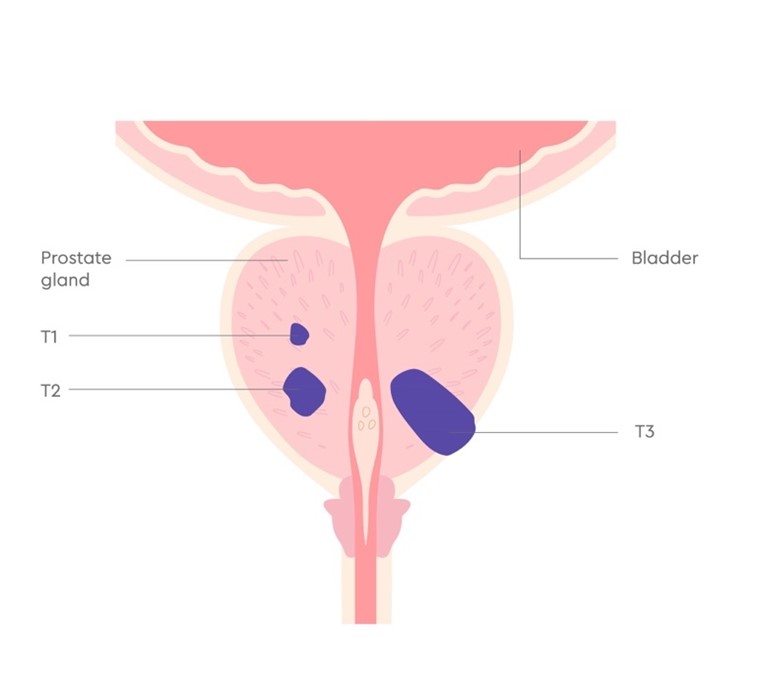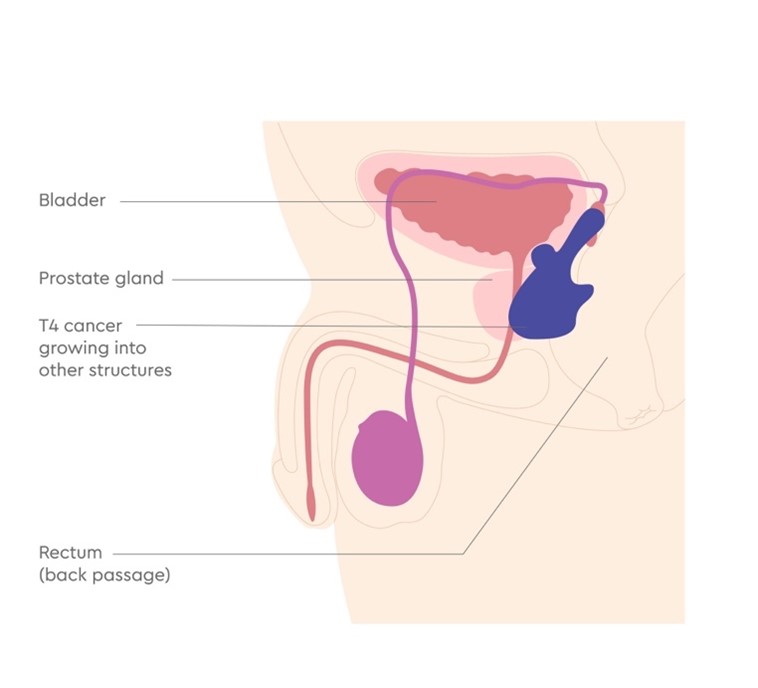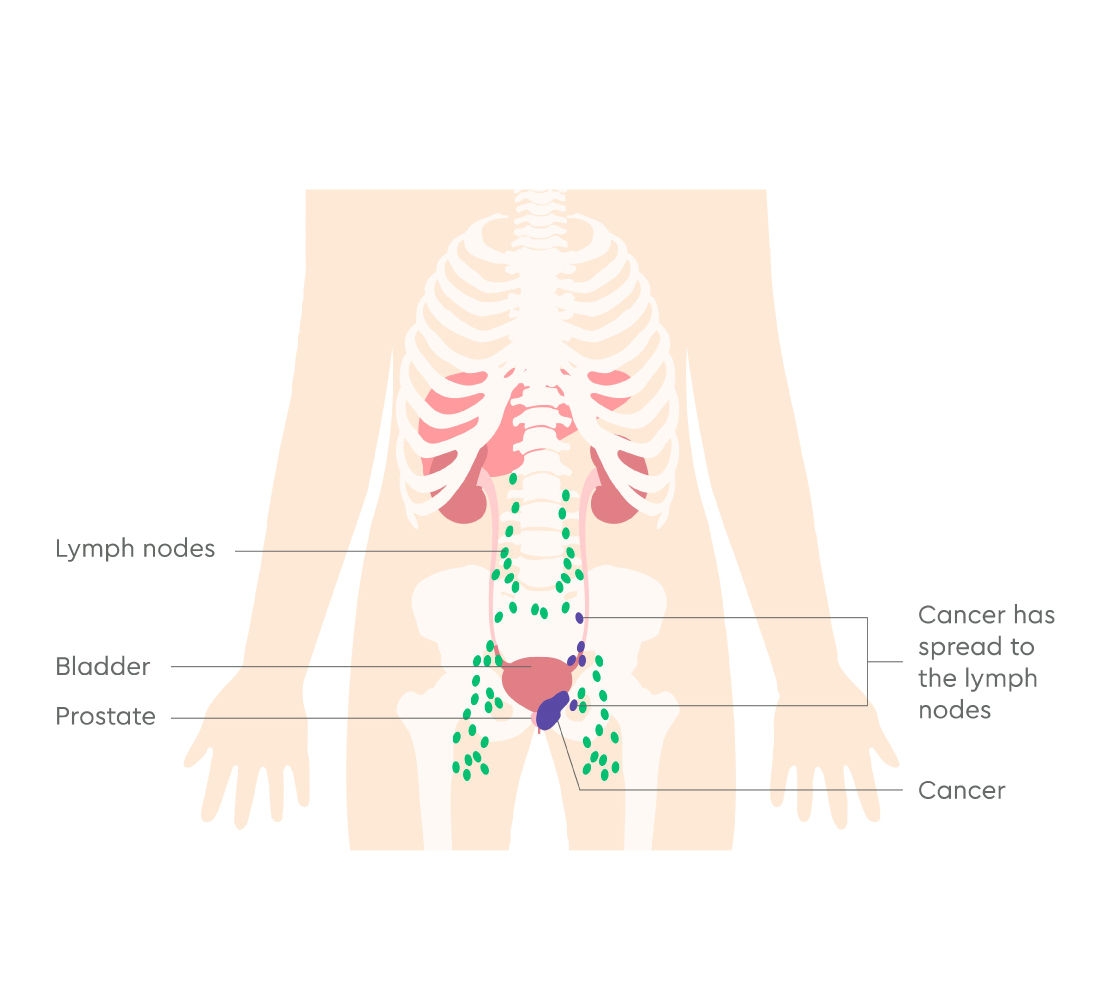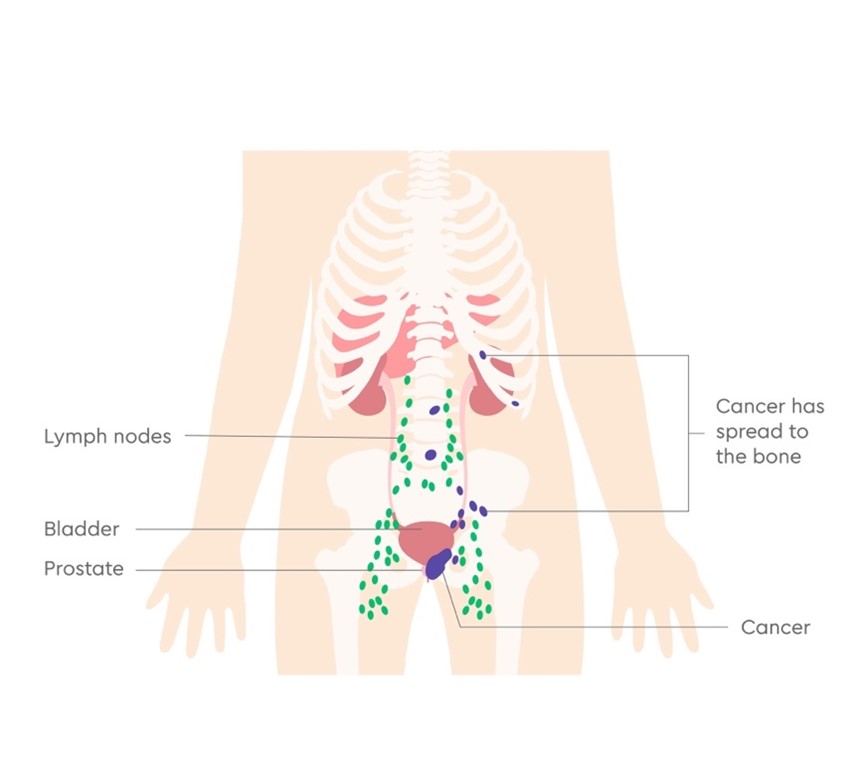What is prostate cancer?
Prostate cancer is the most common cancer type found in men in the UK with one in eight men being diagnosed1 during their lifetime. This type of cancer often starts in the outer part of the prostate gland, but it can develop in any prostate tissue.
Prostate cancer starts in the prostate, which is a male gland that sits under the bladder.
A normal prostate is roughly the size of a walnut and makes prostate fluid, found in semen, and a protein called prostate specific antigen (PSA).
Prostate cancer begins when cells in the prostate gland become abnormal and grow faster than they should. Over time this forms a tumour, which can cause symptoms if it starts to press on the bladder and urine tube (urethra).
Often, prostate cancer grows very slowly and may not need active treatment for some time. But if the tumour is growing quickly, treatment is needed to stop it from spreading through the body.
Prostate cancer can strike at any time in adulthood, but age is the biggest factor. Most cases are in men over 65. The risk increases from age 40 for black men and age 50 for white men.
Where is prostate cancer found?
The prostate gland is underneath the bladder and wraps around the urine tube, called the urethra, next to the rectum. It can be felt through the back passage, approximately 2 inches inside.
Prostate cancer starts in the prostate but can spread elsewhere in the body. This is called metastasis and most commonly happens in the lymph nodes and bones.
Learn more about the prostate in the video below, including where it’s found and common prostate problems.
Prostate cancer early signs and symptoms
Early-stage prostate cancer is when the cancer cells or tumour are only inside the prostate. Often, there are no symptoms at this stage.
As the prostate cancer grows, it may start to press on the bladder and urethra. This can cause symptoms including:
- Finding it hard to start urinating
- Weak urine flow
- Needing to urinate often or urgently, especially at night
- Feeling like your bladder isn't empty after you've just urinated
- Leaking urine
Symptoms of prostate cancer that has spread include bone pain, difficulty getting or keeping erections, blood in the semen or urine, and unexplained weight loss.
Other conditions such as an enlarged prostate (also known as benign prostatic hyperplasia or BPH) can cause similar problems with urination. If you have one or more of these symptoms, it does not mean you have prostate cancer, however you should see a doctor so they can give you the appropriate advice, diagnosis, and treatment if necessary.
Worried about prostate symptoms?
You can be seen within 24 hours by a leading urologist who specialises in diagnosing and treating prostate conditions at our UrologyHub.
Types of prostate cancer
Prostate cancer types
The prostate is made of several types of cells. They form tissues and specialised structures that allow the prostate to function.
The type of prostate cancer is named after the type of cell it starts in.
Acinar adenocarcinoma starts in the outer gland cells of the prostate. This is the most common type of prostate cancer.
Ductal adenocarcinoma starts in the cells that line the tubes (ducts) connecting the prostate to the urethra. It tends to grow faster than acinar adenocarcinoma but is quite rare.
Squamous cell carcinoma starts in flat cells covering the prostate. It often grows quickly and spreads to the bones, lungs or liver. This is incredibly rare.
Small-cell prostate cancer affects neuroendocrine cells, which is another rare type of prostate cancer. Along with urinary symptoms, it can cause neurological symptoms including confusion and pain, because usually this type of cancer spreads very early on.
Grades of prostate cancer
Prostate cancer is graded by looking at the cells under a microscope. The grade measures how different the cancer cells are from normal cells.
Grades are used to understand how the cancer is expected to behave, with a higher number predicting faster growth. This helps decide the best treatment plan.
Stages of prostate cancer
The stage of prostate cancer describes its size and whether it has spread.
A slow growing (low-grade) cancer can reach a later stage if it’s undiagnosed for a long time. Similarly, a fast-growing (high-grade) cancer may be found at an early stage.
T1, T2 and T3 prostate cancer
T1 and T2 are where the cancer cells are only in the prostate, also called localised or early-stage prostate cancer.
T3 is where the cancer has spread to the outer part of the prostate gland and tissues nearby, such as the seminal vesicles. This is called locally advanced prostate cancer.

T4 prostate cancer
Where the cancer has spread beyond the prostate such as the bladder and rectum.

N1 prostate cancer
Where the cancer has spread to lymph nodes or glands in the pelvis.

M1 or metastatic or advanced prostate cancer
Where the prostate cancer has spread through the bloodstream or lymphatic system to other parts of the body. The most common places for prostate cancer to spread are the bones and lymph nodes.

What causes prostate cancer?
Like all cancers, prostate cancer starts with errors in the DNA. These errors can stop cells from understanding their instructions and begin to grow uncontrollably.
There’s no single thing that leads to prostate cancer. But there are risk factors, which increase the chance of getting prostate cancer.
The known risk factors for prostate cancer are:
- Age - prostate cancer is rare before 40, but your risk increases significantly from age 50
- You have a family history of prostate cancer
- Weight - being obese or overweight
- You have different hormone levels - research shows men with higher levels of insulin-like growth factor 1 (IGF-1) have a higher risk of developing prostate cancer
- Your ethnicity is black - research shows, in the UK about 1 in 4 black men will get prostate cancer in their lifetime
If you’re known to have certain risk factors for prostate cancer, you may wish to have more regular prostate screening.
Prostate cancer diagnosis and tests
How is prostate cancer diagnosed?
A digital rectal exam and PSA blood test are the first check-ups for your prostate. They’re used to assess how likely you are to have prostate cancer.
Your consultant or nurse may do a digital rectal exam to see how your prostate feels. A larger, harder or lumpy prostate can be a sign of prostate cancer.
A PSA blood test measures prostate-specific antigen. High PSA levels can be a sign of prostate cancer, though levels can also increase naturally with age or an enlarged prostate.
If your PSA test detects a risk of cancer, then more tests are needed to confirm a diagnosis. These can include an MRI scan and biopsy.
If these tests show you have prostate cancer, further tests and scans can help decide the next steps and if you need treatment. You might have a CT scan, PET-CT scan, or a bone scan.
Our GenesisCare centres offer advanced prostate cancer diagnostic techniques, such as:
- mpMRI scans with MINT reporting - a more detailed scan than MRI, that helps categorise and target suspicious areas in the prostate
- Transperineal prostate biopsy
- Vector prostate biopsy - uses image fusion software and advanced tracking technology for optimal accuracy and comfort and minimal side effects
- PSMA PET-CT scans
- SPECT-CT scan - for detecting and staging prostate cancer and monitoring ongoing treatment
These sophisticated technologies allow us to make fast and accurate treatment decisions.

If your worried about new or existing symptoms you can be seen within 24 hours by a leading urologist, who specialises in diagnosing and treating prostate conditions.
Prostate cancer treatment overview
Prostate cancer can be managed in several ways. The results of your MRI scan and biopsy help decide the best options for you.
This could include:
- Watchful waiting, where you continue to have PSA tests and may have treatment in the future to ease symptoms or control the cancer
- Active surveillance, where your cancer is closely monitored with MRI scans or biopsies so that curative treatment can be offered if needed
- Treatments such a radiotherapy, chemotherapy, other cancer drugs, or Theranostics. Surgery to remove the prostate is also an option.
Learn more about how we treat prostate cancer at GenesisCare.
How is prostate cancer treated?
There are several treatments for prostate cancer. Your care plan typically considers the type, stage and grade of cancer, your overall health, and which treatment outcomes are most important to you.
Surgery
Surgery
Surgery to remove your prostate, called a radical prostatectomy
Radiotherapy
Radiotherapy
Radiotherapy is a non-invasive treatment for prostate cancer that usually aims to completely remove cancer
MRI-guided radiotherapy
MRI-guided radiotherapy
MRI-guided radiotherapy uses innovative technology, enabling prostate cancer treatment to be completed in just five sessions, with less side effects.
Hormone therapy
Hormone therapy
Hormone therapy for prostate cancer, also called androgen deprivation therapy, may be given alongside other treatments like surgery or radiotherapy
Chemotherapy
Chemotherapy
Chemotherapy may offer the best control in certain cases, especially when cancer has spread beyond the prostate
Theranostics
Theranostics
177Lutetium-PSMA therapy is a radioactive anti-cancer drug that can help control treatment-resistant prostate cancer.
Radium-223 therapy is a radioactive anti-cancer drug that can help control prostate cancer that has spread to the bones
Treatment for recurrent Prostate Cancer
Recurrent prostate cancer is when the cancer returns after a treatment that aimed to cure it. This affects around 1 in 5 people.
Previously, prostate cancer treatments like surgery and radiotherapy could only offer limited options for retreatment due to the risk of damage to the bowels and bladder.
Due to the advanced technology and capabilities of the MR Linac, it’s the ideal technology for complex cancer treatment, such as repeated radiotherapy treatment (called reirradiation) for locally recurrent prostate cancer.
Learn more about reirradiation on the MR Linac.
Prostate cancer complications
A complication is a medical problem caused by another condition. Sometimes prostate cancer and its treatment can cause complications, including:
- Problems getting or maintaining an erection
- Urinary incontinence
- Bowel problems
For many people, these side effects are temporary. They can often be resolved or managed with supportive care.
More serious complications from prostate cancer include metastasis, when the cancer spreads elsewhere. There’s also the risk of life-threatening complications from surgery or chemotherapy.
At GenesisCare, we routinely use and invest early in advanced treatments for prostate cancer that aim to deliver the best possible outcomes, with minimal side effects. Your consultant will always explain the benefits and risks of any treatment you’re offered.
Prostate cancer treatment at GenesisCare
We’re the UK’s leading independent provider of cancer care. We offer comprehensive prostate cancer care services from first symptoms through to complex cancer treatment.
At our 14 specially equipped outpatient centres across the UK, our multidisciplinary teams ensure you get a personalised cancer care plan tailored to you.

Learn about the latest treatments we offer for prostate cancer, including advanced radiotherapy techniques that reduce side effects, chemotherapy and hormone therapy
Alongside treatment, we offer integrative cancer care to support you physically and emotionally. Find out how we’re changing prostate cancer care for the better.
FAQs
Studies have found mixed results on whether younger or older people are more likely to be diagnosed with aggressive prostate cancer.
The characteristics of your prostate tumour are more helpful than age in understanding how aggressive the cancer might be.
In the UK, the Cambridge Prognostic Group (CPG) is the system used to predict your risk of having aggressive prostate cancer.
There are five risk groups, which are based on your PSA score and tumour grade and stage.
Your risk group helps your consultant recommend which approach is best for your prostate cancer.
A hereditary disease is passed down through families. Although prostate cancer is influenced by genetics, hereditary prostate cancer is rare.
If you have a family history of prostate cancer or breast cancer, it increases your risk of developing the disease. But this doesn’t mean it’s hereditary or that you’ll definitely get prostate cancer.
Prostate cancer may be considered hereditary when:
- Three or more first-degree relatives (parents, siblings, or children) have prostate cancer;or
- Prostate cancer has appeared in three generations on the same side of the family; or
- Two or more close relatives are diagnosed with prostate cancer before age 55
Some prostate cancers are slow growing, called low-grade cancer. They may only grow slightly over many years, if at all.
Other times, prostate cancer can grow fast, spreading through the body in weeks or months.
It’s not possible to know whether your prostate cancer is growing quickly or slowly until you have tests. That’s why it’s important to see a doctor as soon as possible if you notice symptoms.
Early-stage prostate cancer may not cause any symptoms. As it grows larger and begins to press on the bladder or urethra, it can cause urinary symptoms including:
- Needing to urinate often or urgently, especially at night
- Weak flow
- Difficulty starting to urinate
- Leaking
- Feeling like your bladder is not empty after urinating
Signs that prostate cancer is spreading beyond the prostate include:
- Dull or stabbing pain in the bones - the most common places are the spine (back), pelvis (hips and groin), ribs or skull
- Difficulty getting or keeping erections
- Blood in the semen or urine
- Unexplained weight loss
Usually, people born female do not have a prostate and cannot get prostate cancer.
Around 1 in 200 people are born intersex, which means they have a mix of female and male reproductive organs. Some intersex people have a prostate and can get prostate cancer.
Trans women can get prostate cancer, even if they take hormones or have had gender-affirming surgery. The prostate is not usually removed in reassignment surgery.
Reviewed by:
Dr Philip Camilleri
Consultant Clinical Oncologist
June 2024

